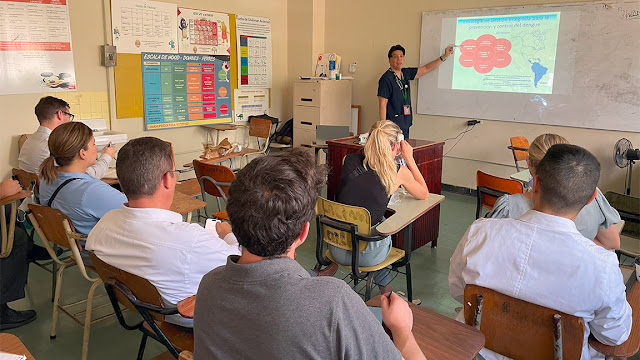Military Healthcare Professionals Enhance Skills Through Field Study of Tropical Diseases in Honduras
USU Faculty Members Lead Team of Uniformed Physicians and Nurses in Tropical Disease Field Training
October 4, 2024 by Claire Pak
A group of 10 Army, Navy, and Air Force healthcare professionals—including staff physicians and nurses, residents, and nurse practitioners—recently completed the final phase of the Military Tropical Medicine training course during a 15-day training trip to Honduras. The mission was led by Army Col. (Dr.) Patrick Hickey, professor and chair of Pediatrics at the Uniformed Services University (USU) Hebert School of Medicine, and Air Force Lt Col (Dr.) Alison Helfrich, assistant professor of Pediatrics at USU.
The trip served as a field practicum focused on preparing military healthcare professionals for deployments and humanitarian assistance missions, according to Helfrich. The participants achieved several educational objectives, including gaining hands-on clinical experience with tropical diseases not endemic to the U.S., such as leishmaniasis and dengue fever, and studying healthcare systems in resource-limited countries. The final learning objective, participation in field preventive medicine and vector surveillance activities, also offered a chance to support public health efforts in Honduras.
Earlier this summer, the Honduras Ministry of Health declared a health emergency for an ongoing epidemic of dengue fever, which is transmitted by Aedes mosquitoes. “The goal was to find mosquito breeding sites to try to disrupt the breeding cycle,” Helfrich said, explaining that in urban environments, Aedes mosquitoes breed “in very small amounts of standing water - and even in empty bottles. Education is key,” she said, explaining that the team visited with community leaders and residents, emphasizing the importance of removing containers where standing water can collect. “This has important military implications, too,” Helfrich said, noting that the same standing water precautions are essential when setting up field lodging in tropical settings.
The USU team also worked with Joint Task Force Bravo entomologists stationed at Joint Base Soto Cano, who provided insect traps, identified all of the captured specimens, and relayed surveillance data back to local health officials. “This was an opportunity to assist and provide information that local officials would not otherwise have,” Helfrich said, noting that local public health workers in Honduras do not always have ready access to the insect traps necessary to catch and identify disease-carrying mosquitoes, and this additional support expanded the reach of their regular operations.
In addition to conducting vector-borne disease surveillance, the team also visited clinical settings, where they observed patient care, participated in bedside rounds, and engaged in knowledge exchange with their Honduran colleagues. Helfrich reported that the Pan-American Health Organization also declared a health emergency in Honduras this summer amid surging hospitalization numbers due to dengue. There are four dengue serotypes, according to Helfrich, and that the surge is attributable to the re-emergence of Serotype 3 this year after two decades of dormancy in the country. With limited prior exposure to Serotype 3, many Hondurans, especially children and young people, have no immunity against it.
During the clinical portion of the training, team members observed the “spectrum of disease” that dengue presents, including fever, intense headache, severe body ache, nausea and vomiting, and rash; and in severe cases, hemorrhagic shock and even death. The body ache is so intense that dengue is nicknamed “breakbone fever.”
“There is no specific cure,” Helfrich said, “only supportive care, including fluid management and pain relief with acetaminophen only, as ibuprofen and other NSAIDS create a risk of bleeding.” Dengue, she explains, differs from other febrile illnesses, with the potential for more severe symptoms setting in after the initial febrile stage ends -- “this is an example when the fever going down isn’t good.” After recovery, patients may continue to experience debilitating fatigue and body aches for weeks and even months.
In addition to their training, Helfrich and the team appreciated the opportunity to offer their Honduran colleagues some assistance in clinical management using their own subject matter expertise. Specifically, Helfrich, an infectious disease specialist who also serves as division chief of Pediatric Infectious Diseases at Walter Reed National Military Medical Center, was able to discuss antibiotic management of non-dengue cases; and team member Army Maj. (Dr.) Ariel Gelman, a staff dermatologist at Walter Reed National Military Medical Center, provided insight for patients admitted with skin conditions.
“Our team learned tremendously from this experience,” Helfrich said, “and gained knowledge that will be invaluable in future deployments or humanitarian assistance missions.”
 |
| https://www3.paho.org/data/index.php/en/mnu-topics/indicadores-dengue-en/dengue-nacional-en/252-dengue-pais-ano-en.html |







